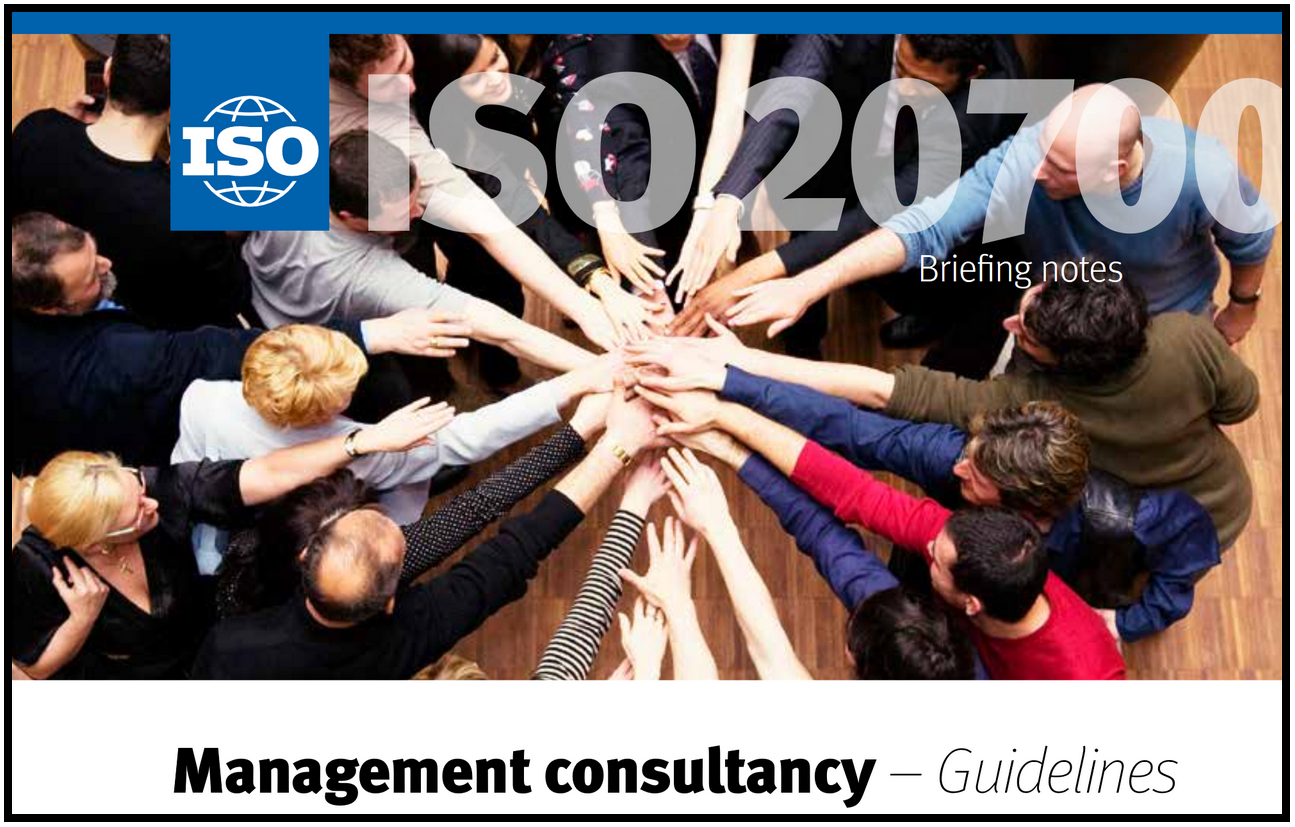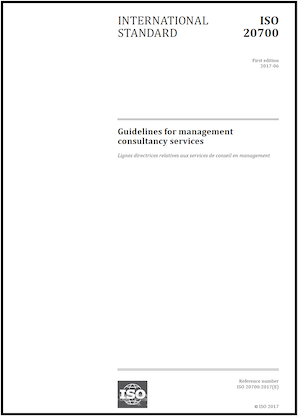
By: Peter Milsom, FCMC, GPM Global
On behalf of CMC-Canada and CMC-Ontario I will be presenting three Blogs on how the ISO 20700 Guidelines for Management Consultancy Services can compliment your Certified Management Consultant, (CMC), designation, how it can be integrated into your consulting practice, how to become approved to use the ISO 20700 Check List, and the benefits of doing so.
I will be working with CMC-Canada to provide a free 20-minute Webinar on July 11 about the basics for ISO 20700:2017 and the CMC-Global Checklist. Later in July, CMC-Canada and I will be offering a two hour paid webinar. Attendees will receive all of the CMC-Global Checklist material once signed up, and the Webinar will go through a case study to show how to use the Checklist material.
The aim of ISO 20700 is to “improve transparency and understanding between clients and management consultancy service providers, in order to achieve better results from consultancy projects.” To quote an extract from ISO 20700:2017:
… is based on good practice from the management consultancy industry. It includes recommendations to improve the specification, execution, acceptance of the outcome and closure of management consultancy services, based on research and the experience of a wide range of Management Consultancy Service Provider and their clients.
I have 20+ years working with European associations and standards bodies, and the Europeans tend to prefer to deal with organizations as opposed to individuals (i.e. the individual management consultants). As the Convenor and Secretary for ISO 20700 were from Europe, it followed the European CEN EN 16114:2011 Management consultancy services standard that also focused on organizations providing services:
The aim of this standard is to improve transparency and understanding between clients and management consultancy service providers (hereinafter referred to as MCSPs). This should lead to better results from consultancy projects and reduce barriers to cross-border trade in management consultancy services.
This offers some advantages, as will be outlined below.
The Guiding Principles for ISO 20700:2017 are that it (Extract from ISO 20700:2017):
a. is written as guidance
b. is applicable to all Management Consultancy Service Providers;
c. applies to organizations, not their internal resources;
d. is based on outcomes;
e. protects innovation and differentiation;
f. emphasizes importance of understanding clients' needs;
g. is easy to understand.

So... what does this mean? What is the value for CMC-Canada? The guidance can be used by CMCs to show clients the baseline international standard for how management consulting engagements should be management and helps to manage expectations and set the tone for the engagement. What is more useful for us though, is the CMC-Global ISO 20700 Self-Declaration Checklist that trained and approved management consultants can use to self-declare with their client that their project is compliant with ISO 20700. It must also be pointed out that CMC-Canada, because of how rigorous our CMC-Canada Uniform Code of Professional Conduct is, has a more mature and disciplined checklist than the rest of the world - which sets us apart from other consultants around the world.
The Players and Relationships for the Guidelines are:
CMC is
- in Ontario, the CMC designation is granted by CMC-Ontario and protected by the c Pr32 Institute of Management Consultants of Ontario Act of 1983. Trademark of the CMC logo is owned and managed by CMC-Canada. The CMC logo has been adopted internationally by CMC-Global, and each national institute is responsible for its use and protection in their respective countries.
- concerned with personal competence
- covering all aspects of consultancy activities
- limited to use by full Member Institutes and CMC Consultants
ISO 20700 is
- the property of ISO
- concerned with process - not competence
- It is also important to emphasize that this is not a how to methodology. The "process" provides a foundational structure for the consulting engagement based on "contracting, execution and closure."
- concerned only with managing a consultancy project
- available for use by anyone
ISO 20700 Project Self Declaration Checklist
- allows CMC-Global (ICMCI) to take ownership of approved use of the Standard
- the checklist is the property of CMC-Global (ICMCI)
Some important Considerations and Context for ISO 20700:2017 are that it is:
- The first ISO Standard for the service sector
- A milestone for the Consultancy Profession
- As opposed to EN 16114, Management consultancy services designed for Europe, this is an ISO internationally recognized guideline
- A Guideline – not a Compliance Standard
- Not intended for external certification
- Beneficial for Consultants & Clients
- Flexible in application to different Client, Industry and Cultural situations
The Structure of ISO 20700:2017 is:
- Awareness of regulatory framework
- Stakeholder engagement and commitment
- Code of ethical and professional conduct
- Project governance
- Capability
- Communication
- Data protection and confidentiality
- Protection of intellectual property
- Social responsibility
- Health and safety
- Risk & quality management
- Guarantees
Section 6 Execution
Section 7 Closure
Annexes:
- Annex A: Supplementary information on ISO Standards
- Annex B: Examples of typical stakeholders
- Annex C: Basic structure of consulting activities
- Annex D: Examples of guidelines for MCSPs for a code of conduct
- Annex E: Examples of guidelines to manage conflicts of interest
- Annex F: Examples of criteria to evaluate capability
- Annex G: Examples of guidelines for MCSPs for typical risk management
- Annex H: Examples of typical understanding activities “pre-assignment”
The next post will deal with the CMC-Global self-declaration Canadian Checklist. This Canadian Checklist, and recommended process, are to be used as a guide for the Certified Management Consultant and client to discuss the project phases and to facilitate and ensure that all required points are covered and understood, and are in agreement with each other.
We encourage you to use this blog post to post any questions, comments, or specific discussion items you would like addressed in the free webinar on July 11 or the paid Webinar on July 23.
--
About the Author - Peter Milsom, FCMC, GPM Global
Peter Milsom helps organizations understand what sustainability means to them, to maximize their benefits and value while minimizing costs and threats. He does this by helping organizations at all levels from the c-suite to the front lines understand what all of the elements of sustainability are, and helping them prioritize and focus on those areas that make the most sense. His area of focus in the sustainability space is change delivery or projects. Peter has also worked on several international standards, and is currently the Convenor of ISO 21502 Guidance on Project Management, and is the Secretary of the ISO 31000 Implementation Guidance Handbook. Peter is currently a Board Member of CMC-Ontario.
For more information on Peter Milsom please refer to his LinkedIn Profile at https://www.linkedin.com/in/petermilsom1/




